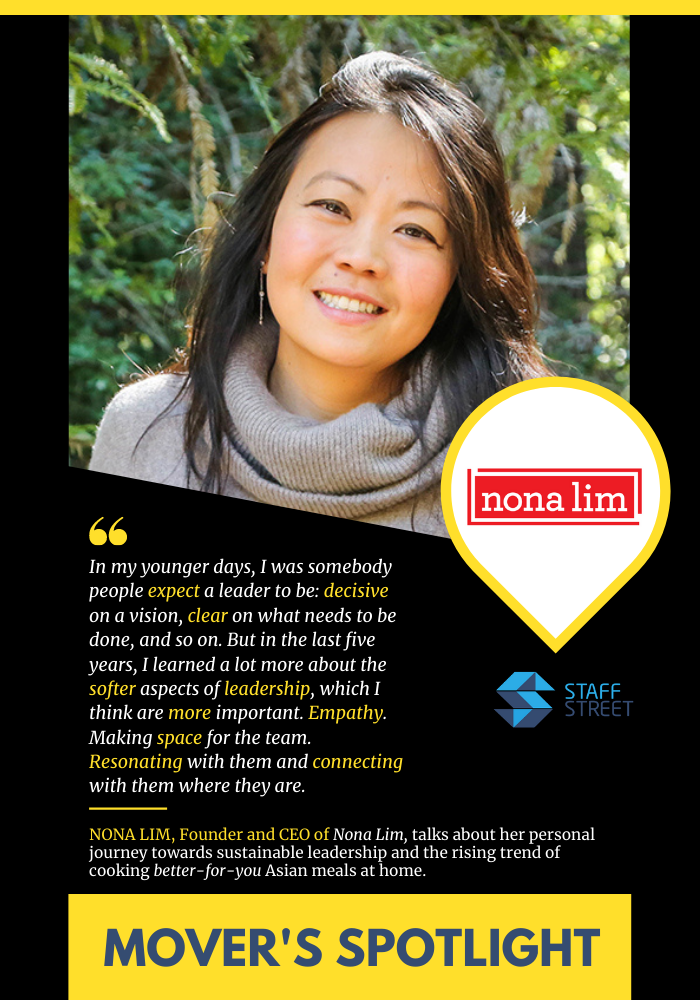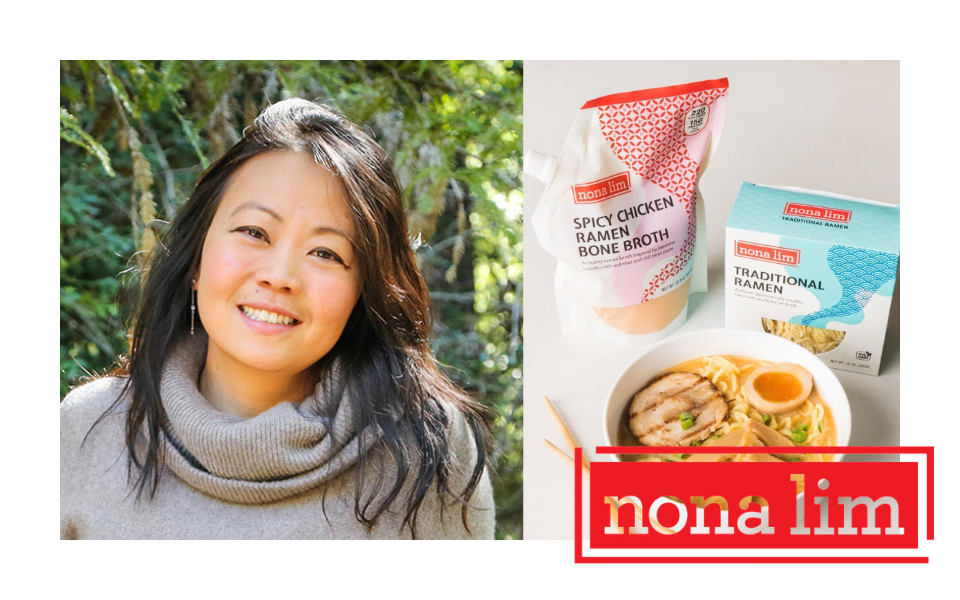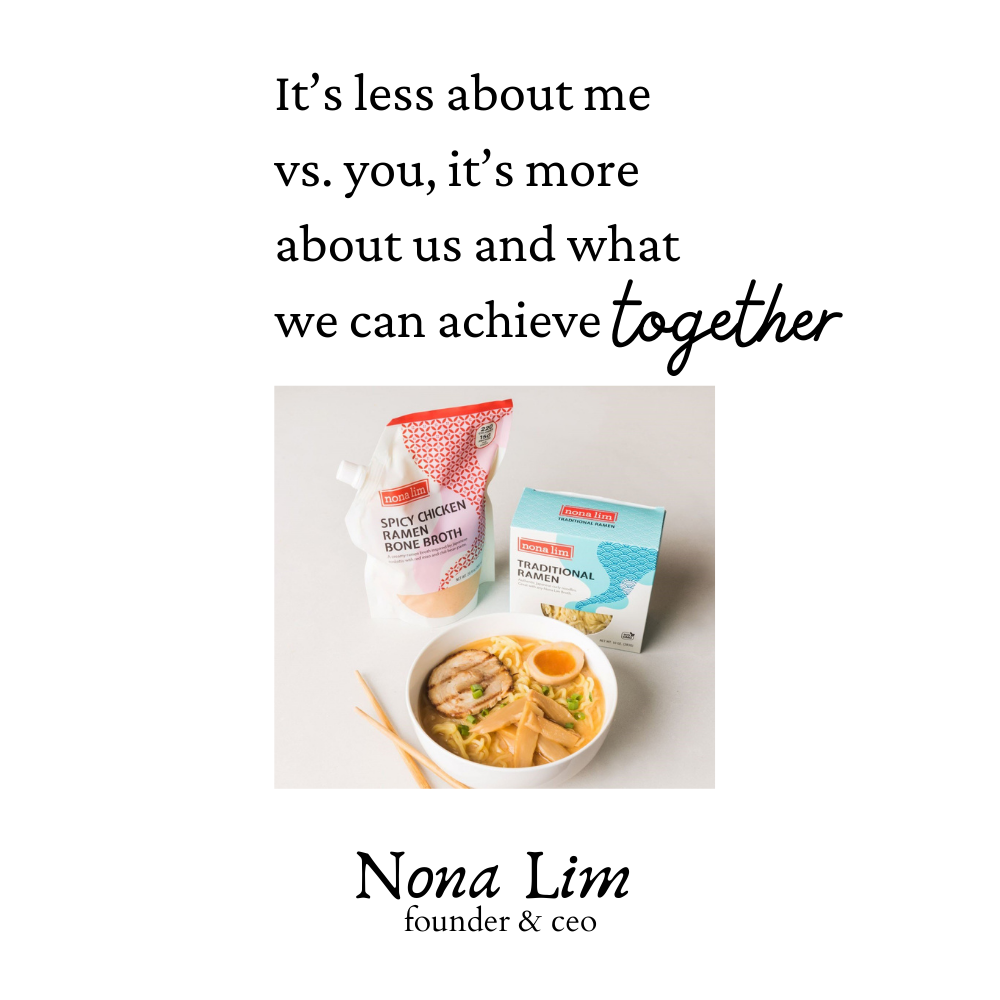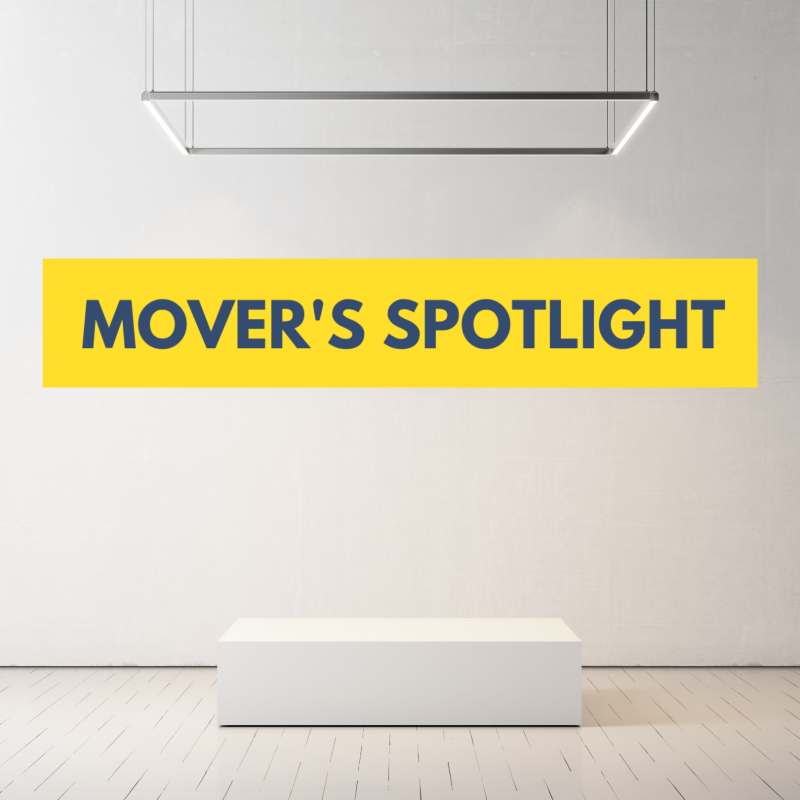
So, Nona Lim, how did you start? What brought you into the CPG food industry, and where did you get the idea for Nona Lim?
Nona Lim: It’s a slightly long story. I grew up in Singapore, moved to London, worked there for eight years in management and software consulting before moving to the Bay Area. My first attempt at entrepreneurship was actually a meal kit delivery business that I started in 2006 as a side hustle. Back then, I was still fencing competitively, representing Singapore.
Wow. That’s so cool.
Nona Lim: I actually almost made the London Olympics in 2012. I missed it by one point in the last match in the Qualifications, which was crushing. I decided to have a baby instead. Then, I took a hard look at the meal kit business and thought it wasn’t sustainable at that point in time. So, I pivoted and launched Nona Lim in 2014 in the CPG business. I wanted to continue my passion for food and manifest the belief that it’s possible to create authentic products that are also healthy and convenient.
With the CPG business, I leaned on my upbringing, which includes a lot of Asian food that I grew up eating. I really wanted to fill a niche that I saw in the marketplace. Back in 2014, there were a lot of incumbent Asian CPGs that had great tasting products but weren’t necessarily healthy. There were also some healthy, better-for-you brands that didn’t taste very good. They weren’t things I would eat on a regular basis.
So, I wanted to fill that niche by creating something that Asian-Americans really enjoy, but would be accessible for everybody else as well in terms of being a healthier, better-for-you option.
Bone broth is a big part of your product suite. For those who don’t know what it is, can you describe this very essential part of Nona Lim.
Nona Lim: We do have some Asian bone broths. It’s usually made from beef bones and chicken bone simmered on low heat for an extended period of time to extract all the nutrients from the bones. It’s very nourishing in that it’s good for your gut, it’s good for your skin, and good for a host of different things.
And we also wanted to infuse it with a lot of Asian flavors. We have turmeric, for example, which is also an anti-inflammatory spice that’s good for you. We also add ginger and goji berry, which are all tasty but also have functional benefits.
And the idea is, you can drink the Nona Lim broth on its own or you could cook with it.
So, you have 8 flavors available right now, but which one is your favorite?
Nona Lim: Oh gosh, which one is your favorite child, right? I think the turmeric chicken bone broth is my go-to for sipping on-the-go. I actually like the coconut and lime chicken bone broth to cook with. You can add seafood to it if you want to. I have it with noodles which is great and convenient.
Looking back on your journey as a CEO, what was the biggest hurdle you’ve had to overcome?
Nona Lim: I think, as a CEO, there are always hurdles along the way. The challenges never end. But certainly finding the right people and building the right team is one of the most important responsibilities of a CEO. As they say, you have to decide where to drive the bus, and you have to have the right people to sit on the bus. Of course there are plenty of challenges along the way, such as managing cash, building the brand, building a team—the list is endless.
Speaking of building teams, what have you learned as a CEO when it comes to leading people? Specifically, while growing the brand and your team at Nona Lim.
Nona Lim: I’ve learned so much over the years. In my younger days, I was probably more of a conventional leader. I was somebody people expect a leader to be: decisive on a vision, clear on what needs to be done, and so on.
But in the last five years, I really learned a lot more about the softer aspects of leadership, which I think are more important. Empathy. Making space for the team. Resonating with them and connecting with them where they are.
Can you talk a little bit about the team that you have right now? What have they brought Nona Lim over the years?
Nona Lim: Absolutely. Having a shared purpose, having shared goals and values are all really important. I see that on my team. Having a team that individually and collectively wants the company to become successful is very important. When you have someone on the team who isn’t aligned, it can create a lot of challenges. Not just between you and the person, but also with the rest of the team.
Right now, I have a team that I’m very grateful for. Everyone is very committed to doing the best that they can do. Everyone is extremely collaborative and committed to our success. It’s less about me vs. you, it’s more about us and what we can achieve together.
For a lot of companies that we work with, that’s one of the biggest organizational pain points: how do you bring people on the same page? In your experience, what’s the best way to align goals and perspectives?
Nona Lim: I think transparency and authenticity are both very important. Providing your team with all the necessary information. It doesn’t matter what level the team is at, they have access to a lot of information, down to the financials, down to the fundraising stages, down to what investors and what the board are saying, down to what the business is doing. Transparency comes with good communication. And being authentic to me also means being both open to feedback and being able to share feedback.
You came from Singapore, lived in London and settled down in the Bay Area. It has been such a long journey. Having lived in all these different business centers around the world, what lessons have stayed with you and have influenced the way you run Nona Lim?
Nona LIm: That’s a good question. Probably, something we took as a tagline in the company—it’s not official, but it’s probably relevant. I always say, “No BS”. It’s a trademark line that I’ve had, from Singapore to London to the Bay Area. It’s something that’s been consistent with me. As I grow older, I have developed more empathy and compassion, but I still believe in “No BS” and I still believe in calling things out. I probably just do it in a less aggressive tone than compared to my younger days.
Would you attribute that to the Bay Area? Is it an influence of the space you’re in right now?
Nona Lim: I think definitely in the Bay Area, there’s a focus a little bit more on spirituality. But there’s also a bit of mellowing with age. Like good wine, it gets better with time (laughs)
Like a good bone broth.
Nona Lim: Exactly. You have to let it simmer.
This month, we’re talking about sustainability. For you, is that something that you consider when you create your product or in any other aspect of your business?
Nona LIm: Yes, absolutely. Sustainability is a journey and a process. I never really get to the final destination. There’s alway something that I can do better. I can’t really be a purist. Because if I want to be a purist, I’ll have everybody grow their own vegetables and cook everything from scratch, because I wouldn’t want to have any carbon footprint and I can’t send products anywhere.
So, for me, what are the little steps we can do to improve each day. We look at our packaging and we look at our pouches. Unfortunately, it is still plastic because there still isn’t compostable packaging material that can take high heat. We look so much into it. We looked at things like recycled plastic, so we can reduce our use of plastic. But is there recycled plastic that’s food safe? We can go on and on.
For us, it’s important to focus on what we can do to do better.
When we started shipping online, we were stuck with using styrofoam, because it was the only material available four years ago. Which was terrible. A year and half ago, we were able to move to eco-friendly compostable packaging for our online shipments, which is awesome. In addition, right now, we’re composting a lot of the things we don’t use.
Also, when I look at sustainability, we have to consider not just the environment. We have to look at sustainability holistically—at people and wages, at the busines. Can this be an actual business that continues to thrive? So to me, it’s a complex topic that affects so many different things. All I can do is to not stop and keep trying.
Take one day at a time.
Nona Lim: Yes, keep taking baby steps.
If you could ask any entrepreneur any question, a leader in the industry or somebody you really admire, who would they be and what question would you ask them?
Nona Lim: Let’s see. I think I would probably ask some of the most successful entrepreneurs—Bill Gates, Jeff Bezos: What are your regrets? What are the things you did wrong? And what are the things you would do differently looking back on your career?
Which is something that I also want to ask you. Is there something in your journey that you wish you had done differently, and how would you frame it as advice for entrepreneurs who are just starting out?
Nona Lim: Everything always takes three times as long and costs four times as much. Patience, and grit are both important.
What are you looking forward to the most in the next year? Where is Nona Lim headed?
Nona Lim: It’s exciting how Asian food is becoming more popular and I see that as a macro trend. Not just in restaurants but also in CPG. A lot of interesting new brands that launched in the last few years will hopefully make clean label Asian food a lot more mainstream, and a lot more popular with consumers. And so I’m excited about seeing the growth there.
That’s a great observation. What specific trends have you personally observed?
Nona Lim: I think noodles are a great one. So far, I think ramen has become more gourmet over the last five years. It’s no longer about cup noodles. People realize they want to cook it at home and cook it in a lot of different ways. I think that’s huge.
Also, we’re seeing Pad Thai and other stir-fried noodles. Consumers are more willing to cook at home. I’m sure the pandemic has accelerated some of that, given that a lot of restaurants were clossed. And many peopled couldn’t get their favorite Thai food from their favorite Thai restaurant. I don’t think Pancit noodles are quite mainstream yet, but we definitely see Pad Thai and Pad See Ew, some of them have become more mainstream and that’s cool for me.
I would like to see every American household that has some kind of pasta in their pantry to have Asian noodles too.














